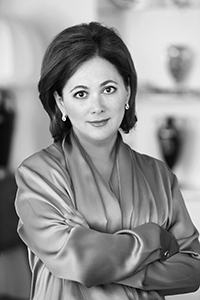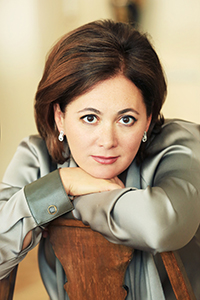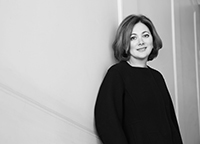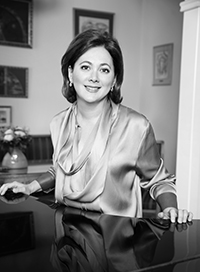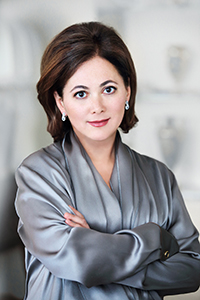Press Quotes |
"... discreet splashes of colour during Zilberquit’s gorgeous rendition of the Largo of BWV1056." |
Gramophone Magazine |
"... Zilberquit’s singing tone and innate sense of line come home to roost in the central Largo e spiccato." |
Gramophone Magazine |
"... judiciously apportioned between piano and strings, while the imitative writing in the finale loses nothing in translation when applied to the piano." |
Gramophone Magazine
|
“The aplomb with which she carries out her digital feats attests to a superior, tasteful performer.” |
Audiophile Audition
|
“Entirely persuasive that the Bach style flows – albeit in Romantic terms – through Zilberquit’s Slavic blood.” |
Audiophile Audition
|
“It is her playing…that you will remember most when you've finished listening, and you'll find it quite accomplished.” |
Classical Candor
|
“Ms. Zilberquit approaches BWV 1052, as she does the others, with a dramatic flair…her manner displays a robust tension and release and exudes both a thoughtful intent and a feeling of playfulness at the same time. These are, in fact, qualities she exhibits throughout the set, and I found them most attractive. All nine concertos resonate with lively good will and, in the case of the slow middle movements, a keen sense of poignancy, tranquility, and reflection.” |
Classical Candor
|
"Pianist Julia Zilberquit gave a virtuosic and expressive performance..." |
New York Arts |
"Astounding performer" |
Orchestral Musical Review
(Greensboro, North Carolina) |
"Pianist Julia Zilberquit gave a virtuosic and expressive performance..." |
New York Arts |
"Shostakovich’s Concertino for Piano and Strings as arranged by pianist Julia Zilberquit, who played the solo part – a vigorous, one-movement work well worth hearing.”
|
New York Post |
"Zilberquit provides a glittering account of the piano part." |
The New York Times |
“Superb performance.” |
The Washington Post |
"Zilberquit was a forceful and rhapsodic soloist." |
Los Angeles Times |
"Zilberquit, a dynamic young pianist with a big technique and an innate sense of musical drama made a vivid impression as a soloist" |
The Seattle Times |
"Zilberquit revealed herself as a romantic poetess of the piano performing Schumann Piano Concerto in A minor, Op. 54 .” |
Der Tagesspiegel (Berlin) |
"Julia Zilberquit performed Haydn Concerto in D major with great tonal variety and pearl-like clarity.” |
Wiener Zeitung (Austria) |
"This ravishing artist is not merely a virtuoso, but she is also endowed with great sensitivity, which she proved with the moving ‘Adagio’ by Bach-Marcello.” |
Dernieres Nouvelles D'Alsace (France) |
"Ms. Zilberquit showed herself worthy to be called of the ‘Russian Piano school.’ She revealed a creative individuality demonstrating beautiful subtle sound and the combination of technical with musicianship and artistic merit.” |
Kultura (Moscow) |
On The CD Three Centuries of Bagatelles |
"Tcherepnin, Lyadov and Denisov are all worthy if little-known contemporaries of Rachmaninoff. Zilberquit's superb performance brought them to life."
|
The Washington Post |
On Shostakovich Concertino |
"The CD includes a robust account of the invitingly lyrical Concertino (Op. 94), originally a piano duet but reworked as a piano concerto by Julia Zilberquit, who is the energetic soloist here.”
|
The New York Times |
"… A glittering job by Julia Zilberquit as both pianist and arranger in the Concertino for Piano and Strings by Dmitri Shostakovich. Zilberquit's arrangement comes from the Concertino for Two Pianos, Opus 94, and it worked so well, you would think the composer must always have wanted it played with strings. Attendees of the 1996 International Music Festival may remember the premiere of the piece that memorable Summer of Shostakovich. Zilberquit's actual performance was quite pleasing in its own merits. Her technically impressive runs never obscured naturally warm musicality, and the audience responded enthusiastically with several people standing during the applause." |
The Seattle Times |
"Pianist Julia Zilberquit's 1996 chamber arrangement of Shostakovich's Concertino, Op. 94, brings a surprising new diminution to this title score. Zilberquit has transformed this originally two-piano work into a sparking bravura piece for solo piano and chamber Orchestra. The witty exchanges and lively contrapuntal interplay between piano and ensemble are the result of smart creative decisions. Appropriate to the work's elegantly drawn lines, representing the composer at his most French neoclassical, the scoring is light and airy, while still maintaining a sense of Shostakovich's authenticity. Given the Classical dimensions of the orchestra with added snare drum, the work's period-bounded idiosyncrasies are even more strongly suggestive of the an early contemporaneous Piano Concerto #2, the score of which was very likely used as a guideline. Ms. Zilberquit, as both arranger and performer, has given birth to a real Shostakovich chamber the Concertino appears in its unique arrangement.”
|
DSCH (A magazine dedicated to Shostakovich life and work) |
On Slonimsky The Jewish Rhapsody |
"The headliner for this concert in the Greensboro Symphony Masterworks season was Moscow-born pianist Julia Zilberquit. This astounding performer commissioned the Russian composer Sergei Slonimsky (b.1932) to write a concerto for piano and orchestra.One would be hard pressed to find a more articulate, powerful, and committed advocate for this wonderful work than Ms. Zilberquit. She easily rose to the challenge of the fiendishly difficult arpeggios that spanned the entire keyboard, and her rich voicing of chordal passages was exquisite. Perhaps what was most amazing about the soloist's playing was her ability to milk an amazing number of colors from the keyboard. Stunning." |
Orchestral Musical Review (Greensboro, North Carolina) |
"Serge Slonimsky's 25-minute The Jewish Rhapsody offers a novel blend of Eastern and Western musical attitudes. Shunning the conventional symmetries and phrasings of Western music, it sets out on an improvisatory course, a series of conversational exchanges between individual instruments in a fashion suggestive of the open-ended forms of Eastern classical music. The piano is the principal conversant in this sparsely and delicately scored work, its pensive and exotic commentaries are marked by frequent flourishes, florid arpeggiations, and gong-like clusters that mimic the sound of harp and percussion. The short phrases that pass from piano to strings, then flute, have a strong Hebraic quality as a result of intrinsic scale patterns, ornamental embellishments, and in general, a mournful pensiveness. The work creates the impression that the listener is eavesdropping on a series of ruminations among rabbinical fathers where ancient Biblical truths about life and religion are passed along in a continuously lyrical, rhapsodic narrative. After a number of hearings, I became quite enchanted with the work and its novel means of expression."
“I cannot imagine a more deeply committed performance of this Jewish Rhapsody than the one the piece receives here. Kudos to all the musicians for meeting the unusual demands of this music, with particular mention of pianist Julia Zilberquit for the very personal quality she brings to her instrument's central role.” |
CD Review (Great Britain) |

